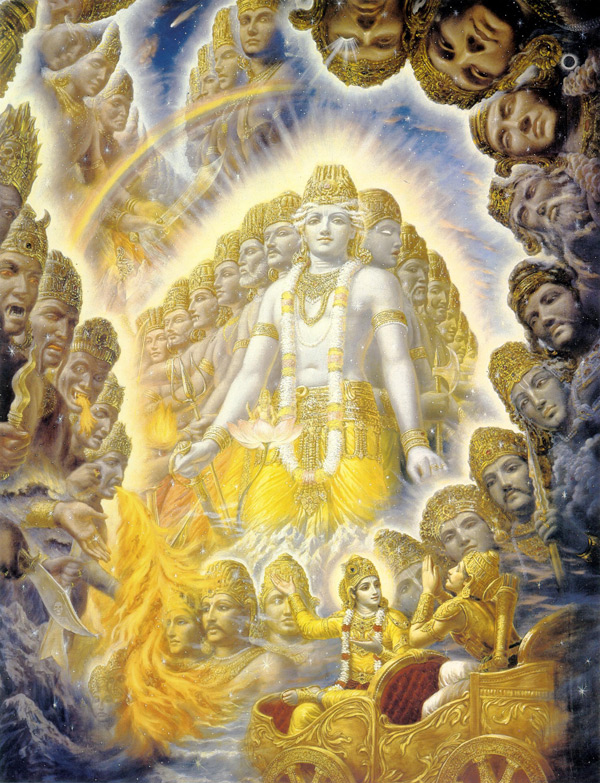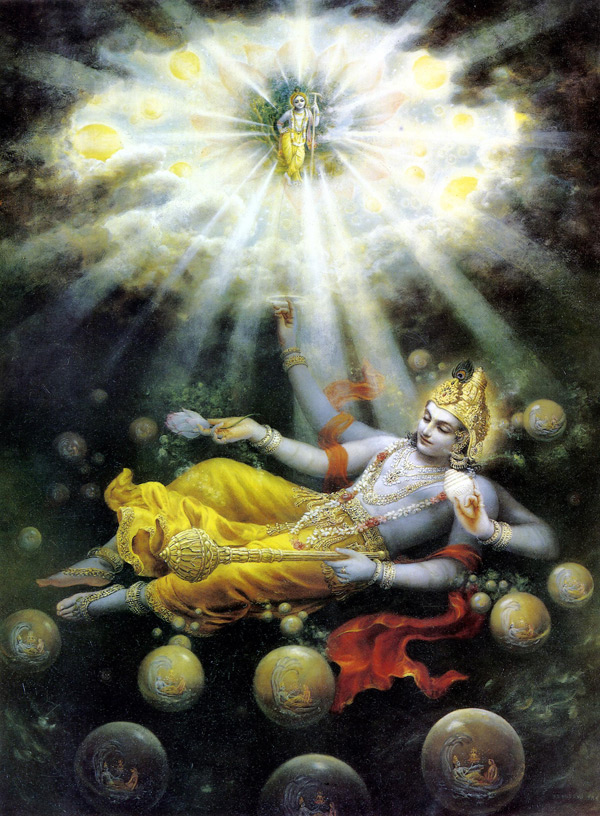The Bhagavad Gita

Introduction
The Bhagavad Gita, often referred to as the Gita, is a 700-verse Hindu scripture that is part of the Indian epic Mahabharata. It is a dialogue between Prince Arjuna and his guide and charioteer, Lord Krishna, on a variety of philosophical issues.
Historical and Philosophical Context
Composed between the 5th and 2nd century BCE, the Gita is set in a narrative framework of a dialogue between Pandava prince Arjuna and his guide Lord Krishna. Facing the duty as a warrior to fight the Dharma Yudhha or righteous war between Pandavas and Kauravas, Arjuna is counselled by Krishna to fulfill his Kshatriya (warrior) duty as a warrior and establish Dharma.
Key Teachings
The Gita presents a synthesis of Hindu ideas about dharma, theistic bhakti, and the yogic ideals of moksha. It advocates various paths for spiritual realization, including:
- Karma Yoga (The Yoga of Action)
- Bhakti Yoga (The Yoga of Devotion)
- Jnana Yoga (The Yoga of Knowledge)
- Raja Yoga (The Yoga of Meditation)
Notable Shlokas (Verses)
Chapter 2, Verse 47 - On Duty and Detachment
कर्मण्येवाधिकारस्ते मा फलेषु कदाचन।
मा कर्मफलहेतुर्भूर्मा ते सङ्गोऽस्त्वकर्मणि॥
karmaṇy-evādhikāras te mā phaleṣu kadācana
mā karma-phala-hetur bhūr mā te saṅgo 'stv akarmaṇi
"You have a right to perform your prescribed duties, but you are not entitled to the fruits of your actions. Never consider yourself to be the cause of the results of your activities, nor be attached to inaction."
This verse emphasizes the importance of performing one's duties without attachment to the results. It encourages action without expectation, promoting a mindset of selfless service.
Chapter 4, Verse 7 - On Divine Incarnation
यदा यदा हि धर्मस्य ग्लानिर्भवति भारत।
अभ्युत्थानमधर्मस्य तदात्मानं सृजाम्यहम्॥
yadā yadā hi dharmasya glānir bhavati bhārata
abhyutthānam adharmasya tadātmānaṁ sṛjāmy aham
"Whenever there is a decline in righteousness and an increase in unrighteousness, O Arjuna, at that time I manifest myself on earth."
This verse speaks about the concept of divine intervention. It suggests that the Divine incarnates in times of moral and spiritual decline to restore balance and righteousness in the world.

Chapter 2, Verse 13 - On the Immortal Soul
देहिनोऽस्मिन्यथा देहे कौमारं यौवनं जरा।
तथा देहान्तरप्राप्तिर्धीरस्तत्र न मुह्यति॥
dehino 'smin yathā dehe kaumāraṁ yauvanaṁ jarā
tathā dehāntara-prāptir dhīras tatra na muhyati
"Just as the boyhood, youth, and old age come to the embodied Soul in this body, in the same manner, is the attaining of another body; the wise man is not deluded at that."
This verse explains the concept of the eternal nature of the soul and the inevitable change of bodies from one life to another.
Chapter 3, Verse 21 - On Leadership by Example
यद्यदाचरति श्रेष्ठस्तत्तदेवेतरो जनः।
स यत्प्रमाणं कुरुते लोकस्तदनुवर्तते॥
yad yad ācarati śhreṣhṭhas tat tad evetaro janaḥ
sa yat pramāṇaṁ kurute lokas tad anuvartate
"Whatever action a great man performs, common men follow. And whatever standards he sets by exemplary acts, all the world pursues."
This verse stresses the importance of leading by example, as people tend to emulate the actions of those they admire or look up to.
Chapter 18, Verse 66 - On Complete Surrender
सर्वधर्मान्परित्यज्य मामेकं शरणं व्रज।
अहं त्वां सर्वपापेभ्यो मोक्षयिष्यामि मा शुचः॥
sarva-dharmān parityajya mām ekaṁ śharaṇaṁ vraja
ahaṁ tvāṁ sarva-pāpebhyo mokṣayiṣhyāmi mā śhuchaḥ
"Abandon all varieties of religion and just surrender unto Me. I shall deliver you from all sinful reactions. Do not fear."
This verse highlights the ultimate teaching of complete surrender to the Divine, ensuring liberation from all sins and suffering.
Chapter 2, Verse 20 - On the Eternal Soul
न जायते म्रियते वा कदाचित्
नायं भूत्वा भविता वा न भूयः।
अजो नित्यः शाश्वतोऽयं पुराणो
न हन्यते हन्यमाने शरीरे॥
na jāyate mriyate vā kadāchit
nāyaṁ bhūtvā bhavitā vā na bhūyaḥ
ajo nityaḥ śhāśhvato 'yaṁ purāṇo
na hanyate hanyamāne śharīre
"For the soul, there is neither birth nor death. It has not come into being, does not come into being, and will not come into being. It is unborn, eternal, ever-existing, and primeval. It is not slain when the body is slain."
This verse describes the eternal and unchangeable nature of the soul, emphasizing that it cannot be killed or destroyed.
Chapter 2, Verse 22 - On the Nature of the Soul
वासांसि जीर्णानि यथा विहाय
नवानि गृह्णाति नरोऽपराणि।
तथा शरीराणि विहाय जीर्णा
न्यन्यानि संयाति नवानि देही॥
vāsānsi jīrṇāni yathā vihāya
navāni gṛihṇāti naro 'parāṇi
tathā śharīrāṇi vihāya jīrṇā
nyānyāni sanyāti navāni dehī
"As a person sheds worn-out garments and wears new ones, similarly, the soul casts off worn-out bodies and enters new ones."
This verse likens the change of body to changing clothes, suggesting that the soul remains unchanged even when the body changes.
Chapter 4, Verse 8 - On the Purpose of Divine Incarnations
परित्राणाय साधूनां विनाशाय च दुष्कृताम्।
धर्मसंस्थापनार्थाय संभवामि युगे युगे॥
paritrāṇāya sādhūnāṁ vināśhāya cha duṣhkṛitām
dharma-sansthāpanārthāya sambhavāmi yuge yuge
"To protect the righteous, to annihilate the wicked, and to re-establish the principles of Dharma, I appear millennium after millennium."
This verse explains the purpose of divine incarnations: to restore righteousness and eliminate forces of evil when they prevail.
Chapter 4, Verse 13 - On the Fourfold Division of Society
चातुर्वर्ण्यं मया सृष्टं गुणकर्मविभागशः।
तस्य कर्तारमपि मां विद्ध्यकर्तारमव्ययम्॥
chātur-varṇyaṁ mayā sṛiṣhṭaṁ guṇa-karma-vibhāgaśhaḥ
tasya kartāram api māṁ viddhy akartāram avyayam
"The four categories of occupations were created by Me according to people's qualities and activities. Although I am the creator of this system, know Me to be the non-doer and eternal."
This verse explains the concept of the four divisions of society based on one's qualities and work, while emphasizing that the Divine remains unaffected and beyond these divisions.
Chapter 9, Verse 22 - On Surrender to God
अनन्याश्चिन्तयन्तो मां ये जनाः पर्युपासते।
तेषां नित्याभियुक्तानां योगक्षेमं वहाम्यहम्॥
ananyāśh chintayanto māṁ ye janāḥ paryupāsate
teṣhāṁ nityābhiyuktānāṁ yoga-kṣhemaṁ vahāmy aham
"To those who are constantly devoted and who worship Me with love, I give the understanding by which they can come to Me."
This verse highlights the power of unwavering devotion and how God ensures the well-being of those who surrender to Him fully.
Chapter 2, Verse 15 - On Steadfastness
यं हि न व्यथयन्त्येते पुरुषं पुरुषर्षभ।
समदुःखसुखं धीरं सोऽमृतत्वाय कल्पते॥
yaṁ hi na vyathayanty ete puruṣhaṁ puruṣharṣhabha
sama-duḥkha-sukhaṁ dhīraṁ so 'mṛitatvāya kalpate
"O best among men, the person who is not disturbed by happiness and distress, and is steady in both, becomes eligible for liberation."
This verse emphasizes the importance of being equanimous in the face of both joy and sorrow, which is key to attaining liberation.
Chapter 5, Verse 10 - On Detached Action
ब्रह्मण्याधाय कर्माणि सङ्गं त्यक्त्वा करोति यः।
लिप्यते न स पापेन पद्मपत्रमिवाम्भसा॥
brahmaṇyādhāya karmāṇi saṅgaṁ tyaktvā karoti yaḥ
lipyate na sa pāpena padma-patram ivāmbhasā
"One who performs their duty without attachment, surrendering the results unto the Supreme, is unaffected by sinful actions, just as a lotus leaf is untouched by water."
This verse encourages detached action, comparing a person acting without attachment to a lotus leaf that remains untouched by water.
Chapter 10, Verse 8 - On the Supreme Source
अहं सर्वस्य प्रभवो मत्तः सर्वं प्रवर्तते।
इति मत्वा भजन्ते मां बुधा भावसमन्विताः॥
ahaṁ sarvasya prabhavo mattaḥ sarvaṁ pravartate
iti matvā bhajante māṁ budhā bhāva-samanvitāḥ
"I am the source of all spiritual and material worlds. Everything emanates from Me. The wise who know this worship Me with all their hearts."
This verse highlights the omnipotent nature of God as the source of all creation and the importance of realizing this truth to engage in heartfelt devotion.

Chapter 10, Verse 11 - On Divine Compassion
तेषामेवानुकम्पार्थमहमज्ञानजं तमः।
नाशयाम्यात्मभावस्थो ज्ञानदीपेन भाज्वता॥
teṣhām evānukampārtham aham ajñāna-jaṁ tamaḥ
nāśhayāmy ātma-bhāva-stho jñāna-dīpena bhāsvatā
"Out of compassion for them, I, dwelling in their hearts, destroy the darkness born of ignorance with the shining lamp of knowledge."
This verse expresses divine compassion, where God dispels ignorance and illuminates the minds of devotees with knowledge.
Chapter 2, Verse 47 - On Duty without Attachment
कर्मण्येवाधिकारस्ते मा फलेषु कदाचन।
मा कर्मफलहेतुर्भूर्मा ते सङ्गोऽस्त्वकर्मणि॥
karmaṇy-evādhikāras te mā phaleṣhu kadāchana
mā karma-phala-hetur bhūr mā te saṅgo 'stv akarmaṇi
"You have a right to perform your prescribed duties, but you are not entitled to the fruits of your actions. Never consider yourself to be the cause of the results of your activities, nor be attached to inaction."
This verse emphasizes action without attachment to results, encouraging a selfless approach to duty.
Chapter 6, Verse 5 - On Self-Elevation
उद्धरेदात्मनात्मानं नात्मानमवसादयेत्।
आत्मैव ह्यात्मनो बन्धुरात्मैव रिपुरात्मनः॥
uddhared ātmanātmānaṁ nātmānam avasādayet
ātmaiva hyātmano bandhur ātmaiva ripur ātmanaḥ
"One must elevate, not degrade, oneself. The mind is the friend of the conditioned soul, and his enemy as well."
This verse emphasizes self-mastery, explaining how the mind can either be one's best ally or worst enemy depending on one's control over it.
Chapter 6, Verse 6 - On Mastery of the Mind
बन्धुरात्मात्मनस्तस्य येनात्मैवात्मना जितः।
अनात्मनस्तु शत्रुत्वे वर्तेतात्मैव शत्रुवत्॥
bandhur ātmātmanas tasya yenātmaivātmanā jitaḥ
anātmanas tu śhatrutve vartetātmaiva śhatruvat
"For one who has conquered the mind, the mind is the best of friends; but for one who has failed to do so, his mind will remain the greatest enemy."
This verse explains the importance of controlling the mind, which can either support or hinder spiritual progress.
Chapter 4, Verse 39 - On Faith in Knowledge
श्रद्धावान्लभते ज्ञानं तत्परः संयतेन्द्रियः।
ज्ञानं लब्ध्वा परां शान्तिमचिरेणाधिगच्छति॥
śhraddhāvān labhate jñānaṁ tat-paraḥ saṁyatendriyaḥ
jñānaṁ labdhvā parāṁ śhāntim achireṇādhigachchhati
"A person who is full of faith, who is devoted, and who has subdued the senses, obtains knowledge. And having achieved knowledge, he quickly attains supreme peace."
This verse highlights the role of faith, discipline, and devotion in gaining knowledge, which leads to inner peace.
Chapter 6, Verse 7 - On Mental Equanimity
जितात्मनः प्रशान्तस्य परमात्मा समाहितः।
शीतोष्णसुखदुःखेषु तथा मानापमानयोः॥
jitātmanaḥ praśhāntasya paramātmā samāhitaḥ
śhītoṣhṇa-sukha-duḥkheṣhu tathā mānāpamānayoḥ
"For one who has conquered the mind, the Supersoul is already reached, for he has attained tranquility. To such a person, happiness and distress, heat and cold, honor and dishonor are all the same."
This verse emphasizes mental equanimity, explaining how inner peace makes external circumstances like happiness and distress irrelevant.
Chapter 3, Verse 21 - On Leading by Example
यद्यदाचरति श्रेष्ठस्तत्तदेवेतरो जनः।
स यत्प्रमाणं कुरुते लोकस्तदनुवर्तते॥
yad yad ācharati śhreṣhṭhas tat tad evetaro janaḥ
sa yat pramāṇaṁ kurute lokas tad anuvartate
"Whatever action is performed by a great man, common men follow. And whatever standards he sets by exemplary acts, all the world pursues."
This verse underscores the responsibility of leaders to set positive examples, as their actions influence others.
Chapter 3, Verse 21 - Guidance by Example
यद् यद् आचरति श्रेष्टस्तत्तद् एव इतरः जनः।
स यत् प्रामाणं कुरुते लोकस्तदनुवर्तते॥
yad yad ācarati śreṣṭhas_tattad eva itaraḥ janaḥ
sa yat pramāṇaṁ kurute lokastad anuvartate॥
"Whatever the superior person does, that other people also do. The world follows the example of the great."
This verse emphasizes the importance of guidance by example; people are influenced by the actions of great individuals.
Chapter 3, Verse 22 - Duties of a Leader
न मे पार्थास्ति कर्तव्यं त्रिषु लोकेषु किंचना।
नानवाप्तमवाप्तव्यं वर्त एव च कर्मणाम्॥
na me pārthāsti kartavyaṁ triṣu lokeṣu kiṁchanā।
nānavāptamavāptavyaṁ varta eva ca karmaṇām॥
"O Arjuna, I have no duties in all three worlds, nor do I have anything to attain."
In this verse, Krishna explains that as a supreme being, he has no duties and gains from his actions, yet he acts for the welfare of the world.
Chapter 3, Verse 23 - Establishing an Example
उदाहरणात्मनं कर्म न तु मे स्वाधीनता।
लोकसंग्रहमेवापि सत्त्वधर्मोऽस्मितेऽस्मिन्स्थितः॥
udāharaṇātmanam karma na tu me svādhīnatā।
lokasaṅgrahamevāpi sattvadharmo’ṣmitē’ṣminsthitah॥
"If I do not perform my prescribed duties, people will certainly follow my example."
Here, Krishna indicates that by fulfilling his duties, he sets an example for others and emphasizes the importance of duty over self-interest.
Chapter 3, Verse 24 - Sacrifice for Welfare
सक्ताः स्वधर्मेऽपि कर्म न कर्मणामकर्मतामिति।
तत्रापि सत्त्वधर्मोऽस्मिन्स्थितः॥
saktāḥ svadharme’pi karma na karmaṇām akarma-tāmiti।
tatrāpi sattva-dharmo’ṣmin sthitaḥ॥
"If I do not perform my prescribed duties, the world will perish."
This verse emphasizes the necessity of Krishna’s actions; without them, everything would descend into chaos.
Chapter 3, Verse 25 - On Knowledge and Ignorance
अध्यात्मविद्यायाः परः परार्थसंस्थिता।
नान्यतः कर्तव्यं सत्यमिदमपि द्विजातिमुच्यते॥
adhyātma-vidyāyāḥ paraḥ parārtha-saṁsthitā।
nānyataḥ kartavyaṁ satyam idam api dvijātimucyate॥
"Those who are wise and understand the ways of the world do not act for their own benefit."
This verse highlights that true knowledge and understanding come from recognizing the purpose behind actions, which goes beyond personal gain.
Chapter 3, Verse 26 - On Encouragement
तस्माद् हि प्रेक्ष्ये तद्गुर्वत्साधुसंस्थिता।
जनास्त्वन्यथा दुष्टतादात्मानं स्वधर्मवर्जितम्॥
tasmād hi prekṣye tad-gurvat sādhusaṁsthitā।
janāstvanyathā duṣṭatād-ātmanam svadharma-varjitām॥
"Therefore, one should encourage others to fulfill their prescribed duties."
In this verse, Krishna advises that one should inspire others to follow their duties, promoting the idea of collective responsibility.
Chapter 3, Verse 27 - Nature of Actions
सर्वं कर्माखिलं परं यद् यद् च कर्तुं प्रवृत्तिमेत्य।
तदात्मा तेऽविभक्तोऽस्मिन्साम्यं प्राप्यते॥
sarvaṁ karmākilaṁ paraṁ yad yad ca kartuṁ pravṛttim etya।
tad-ātma te’vibhakto’smin sāmyam prāpyate॥
"All actions are performed by the modes of material nature; but one who is not attached to those modes is liberated."
This verse conveys that while actions are performed under the influence of the modes of nature, true liberation comes from understanding one’s true self.
Chapter 3, Verse 28 - Knowledge of the Self
विमुक्तस्तु यदा सत्त्वेनात्मनि प्रतिष्ठितम्।
स्वधर्मानुशासनान्वितः पातकं नातिवर्तते॥
vimuktastu yadā sattvena ātmani pratiṣṭhitam।
svadharmānusāsanānvitah pātakaṁ nātivartate॥
"When one is situated in the self with purity, he is free from sin."
Here, Krishna states that by being established in the self and remaining detached from the modes, one is freed from sinful actions.
Chapter 3, Verse 29 - On Desires
अहंकारं तु विहाय सत्त्वधर्मं सहिष्णुता।
शुद्धयात्मा ततः पापं न विधायते॥
ahaṁkāraṁ tu vihāya sattva-dharmaṁ sahiṣṇutā।
śuddhayātmā tataḥ pāpaṁ na vidhāyate॥
"By abandoning false ego and adhering to one’s duty, a pure soul does not incur sin."
This verse highlights the significance of surrendering ego and remaining true to one’s duties, which helps one remain free from sin.
Chapter 3, Verse 30 - Detachment in Action
इदं न मन्यते बोधं तु कर्मणि स्वधर्मे।
आत्मनिर्भरः सन् सर्वानुत्सृज्यते॥
idaṁ na manyate bodhaṁ tu karmaṇi svadharme।
ātmanirbharaḥ san sarvānutṣṛjyate॥
"One who is self-sufficient and acts without desires is free from all actions."
In this verse, Krishna explains that by being self-sufficient and detached from desires, one can achieve liberation from the bondage of actions.

